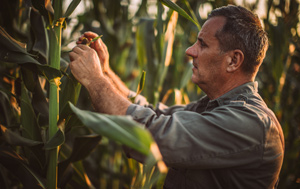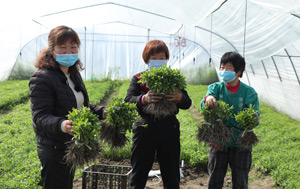Tate & Lyle’s Director of Sustainability Anna Pierce on partnering to drive positive impact through support for regenerative agriculture.
This article was featured in Tate & Lyle’s digital report Protecting Planet and People through Ingredient Innovation published in Sustainability Magazine.
Why is responsible ingredient sourcing so important for food and drink businesses? As companies assess and start reporting on their carbon footprint, they realise that most of their emissions come from their supply chain. That presents a real challenge, even for leading industry players: how to mitigate climate change outside of their factory gates, and how to access reliable data and insights to inform business decisions and satisfy stakeholders, today and tomorrow.
All companies need to provide a level of transparency and Tate & Lyle knows this trend, and its associated complex and ever-changing requirements, is here to stay. The company believe that ingredient suppliers have a special opportunity to help producers with impact visibility, such as product carbon footprint data, and to support the cultivation of sustainably grown raw materials for what later become the food products that we see on the shelf.
First step: understanding individual and shared goals
While demonstrating positive environmental impact is expected by governing bodies and investors, businesses increasingly want to share their sustainability progress as a matter of reputational differentiation and overall commitment to responsible sourcing, operations, innovation and growth.
Tate & Lyle’s Director of Sustainability Anna Pierce advocates a united process for moving forward.
“Tate & Lyle connects farmers, who are ultimately the suppliers of all our food and drink, and consumer goods companies that are working to formulate sustainability programmes and collective goals to drive real change,” says Pierce.
“Our role is to work with farmers to understand which agricultural practice changes will make the biggest impact environmentally while providing a more positive return on their investment so that everyone moves forward collectively.”
Where food companies should start with sustainable sourcing
DO
- Ask your ingredient suppliers if they have sustainable sourcing programmes and how to get involved
- Assess verification requirements to learn about claims criteria
- Be transparent with data to help all sides meet their climate goals
DON'T
- Wait for perfection when building a greenhouse gas emissions baseline or collecting carbon footprint data
- Be afraid to ask peers, trade bodies or NGOs for advice
- Risk reputational or regulatory impacts by failing to act
Aligning views: Why care about sustainable sourcing?
Pierce sees organisations’ own ambitions to reduce and eventually eliminate their impacts as being aligned with those who consume their goods.
“Consumers have indicated that they’re more interested in sustainable products. Investors, employees and future talent also want to see clear evidence that businesses are acting in society’s best interests.”
“Investors especially want to be assured that companies are strengthening resilience to climate change and that it’s part of the planning and risk assessment process. Ultimately, I believe the companies that most value sustainability will be successful, but everyone needs to act with urgency to mitigate the worst effects of climate change,” Pierce explains.
With motivations clearly aligned, how can companies communicate what they’re doing? As reporting standards and metrics vary greatly, Pierce believes certification through respected schemes and transparent ESG reporting must be leveraged until a unified approach to disclosures is developed, and it isn’t on the horizon.
“In some cases, companies make use of on-pack certification like Fairtrade or Rainforest Alliance where consumers have a level of trust if only a vague understanding of what it represents,” says Pierce.
“Everyone has their own take on what counts as ‘sustainable’. I see this as an opportunity to come together and collectively agree on what responsible sourcing looks like so we and our customers can help consumers understand it.”
Our approach to sustainable agriculture focuses on protecting the planet through regenerative agriculture practices while improving the social and economic well-being of the farmers and local communities that make up our supply chain.
For its part, Tate & Lyle approaches responsible sourcing through its programmes in the US and China. The company has enrolled the equivalent of 100% of the corn it uses annually in a sustainable agriculture programme developed with Truterra, LLC in 2018. Through the programme, now led by Primient, Tate & Lyle helps its customers advance the adoption of regenerative farming practices that restore soil health and gain insight into the impact they are helping to drive.
Working with environmental charity Earthwatch Europe and Nanjing Agricultural University in eastern China, the company supports growers of stevia, used to make the leading plant-based sweetener on the market, to reduce their environmental impact while reaping productivity and economic gains. “Through our farmer partnerships, we use science and technology to demonstrate that more sustainable and regenerative practices that restore soil health are good for the planet AND the farmer.”
This new way of connecting those working on the farm to those creating the food we eat presents a big opportunity: healthier, more productive land, food brands demonstrating positive change, and a chance to capture carbon while reducing emissions.
How Tate & Lye’s programmes support customer sustainable sourcing goals
Participating customers…
…want to show the ingredients they buy are responsibly sourced with supporting data
…choose to opt into Tate & Lyle’s sustainable agriculture programmes
…partner to accelerate regenerative agriculture practice adoption
…benefit from primary greenhouse gas data and emissions reductions to achieve their own targets
…incorporate this third party verified data into their ESG reporting


